|
|
|
Sort Order |
|
|
|
Items / Page
|
|
|
|
|
|
|
| Srl | Item |
| 1 |
ID:
175109
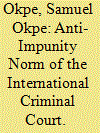

|
|
|
|
|
| Summary/Abstract |
In recent years, the position of the International Criminal Court (ICC) in Africa has become an issue of contention. Through the African Union (AU), African leaders have expressed their concern in relation to the principle of impunity and self-sovereignty of African nations. The AU asserts fiercely that the influence of the ICC is overwhelming on the African continent; therefore, African leaders clamor for an amendment to the court or even a total withdrawal. I argue that the change of relationship initiated by the AU is not only selfish but also unequivocally harmful to the tenets of justice, law and order. By way of a vast exploration of data (internet sources, official government records, print sources and online interviews), this study reiterates the importance of the anti-impunity norm of the ICC as an instrument of equity, especially when African leaders are involved.
|
|
|
|
|
|
|
|
|
|
|
|
|
|
|
|
| 2 |
ID:
175105
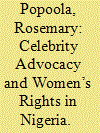

|
|
|
|
|
| Summary/Abstract |
To bring development closer to the reality of “ordinary” people, popular personalities, working on behalf of themselves, family, or organizations (profit and non-profit) in Africa have consistently given visibility to social problems to influence public opinion for positive transformation. The involvement of celebrities in development-centered issues has evoked debates from scholars in the global north who thought that their act is an extension of neoliberalism that sought to transform complex social realities into a spectacle of performance and entertainment for public amusement. While scholars in Europe and North America have engaged the intersections of celebrity advocacy and development discourse, little attention has been given to this phenomenon by their counterparts in Africa. Drawing from primary sources (including films, video, audio, newspaper articles, autobiography) as well as secondary data in the fields of sociology, women’s and gender studies, media, and popular culture, this paper examines the interrelatedness of celebrity advocacy and social reforms in Nigeria. It shows that while celebrity advocacy promotes awareness and consciousness about women’s rights, it often does not lead to protection (enforcement and change) in the socio-economic and political status of women.
|
|
|
|
|
|
|
|
|
|
|
|
|
|
|
|
| 3 |
ID:
175103
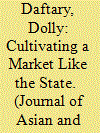

|
|
|
|
|
| Summary/Abstract |
Global policy organizations, financial institutions, and national governments have emphasized high-value agriculture in the world’s semi-arid areas inhabited by the greatest proportion of its poor, stressing linking households to markets to improve their well-being. This is assumed to involve state withdrawal and the ascendance of self-evident market forces. By means of ethnographic fieldwork in semi-arid western India, this paper discusses how the market does not arise spontaneously, but is deepened through state intensification. Rural households are imbricated with new markets by the state’s rendering of development policy market-driven, and through democratic decentralization, which has emerged as an instrument to facilitate the penetration of market actors into remote rural communities.
|
|
|
|
|
|
|
|
|
|
|
|
|
|
|
|
| 4 |
ID:
175104
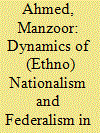

|
|
|
|
|
| Summary/Abstract |
The paper examines how an (ethno)nationalist movement developed and took shape in Balochistan in relation to a broader national question that ranges from seeking provincial autonomy within the federation of Pakistan to gaining independence and formation of a separate state of Balochistan. The paper also analyses the estranged relationship of Balochistan with the state of Pakistan against the background of the failure of the state in accommodating the Baloch national aspirations for economic, social and political rights, while adhering to the basic tenets of federalism. The Baloch, who sporadically engaged in armed conflicts with the state after the British left the Indian Subcontinent in 1947, were not merely the pawns of geopolitics. The conflict in Balochistan must also be seen in a greater context of nationalism as an effort of the Baloch elite to achieve more autonomy within the federal structure of Pakistan. The movement for more national autonomy under the slogan of nationalism may be understood as a tool to further consolidate the social, economic and political strengths of the traditional tribal structure of Balochistan, instead of a struggle for economic and political empowerment of the people of Balochistan. The genuine economic and political aspirations of the people were doubly constrained. On the one hand, the centuries old tribal-centric social structure impeded any social and political evolution in the province and, on the other hand, the limitations of the federal structure in Pakistan restrained Balochistan’s integration into the mainstream national polity and economy. The paper argues that the emergence of nationalism is shaped, firstly by the historical legacy of the colonial era, the identity politics of Baloch nationalists, resource-grabbing and hegemonic approach of the Baloch Sardars or tribal chieftains, and secondly by Pakistan’s failure in adhering to the principles of federalism. Extreme centralization or quasi federalism with its authoritarian nature has promoted regionalism and centrifugal tendencies. Balochistan being a periphery happened to be a fertile ground for the emergence and development of a nationalist movement against the attitudes of the state of Pakistan, which led towards a conflict situation between Balochistan and the state of Pakistan.
|
|
|
|
|
|
|
|
|
|
|
|
|
|
|
|
| 5 |
ID:
175108
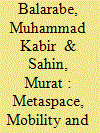

|
|
|
|
|
| Summary/Abstract |
The street vendor’s (SV) potential mobility in subverting authorities’ hegemony over public space has been theorised within the contexts of urban informality and resistance. Discussions mainly revolve around movement tactics as resistance strategy while evading arrests and confiscations. This negates SV agency and limits understanding mobility in resistance. Using Bunschoten’s metaspace and Cresswell’s aspects of mobility, this paper employs semi-structured interviews with mobile SV, road users and pedestrians in Kano (Nigeria), to describe vendors’ mobile practices and how they delay hostility from the state. Observing the interplay between vendors, users and environment, this paper identifies four types of vendor movement: focused, targeted, sporadic and self-regulatory; and examines how vendors exploit Cresswell’s speed and rhythm in challenging formal urban practice hegemony through continuous operation. The paper also describes how vendors’ movement affects other actors’ mobilities. Finally, the paper discusses urban design implications for integrating SV within city plans, setting out potential proposals.
|
|
|
|
|
|
|
|
|
|
|
|
|
|
|
|
| 6 |
ID:
175101


|
|
|
|
|
| Summary/Abstract |
Despite the proliferation of poverty studies, poverty in Brunei Darussalam (hereafter, Brunei) is under-researched. What poverty means in Brunei is, therefore, little understood, and there is a local belief that poverty in the country is unique and relative. Moreover, the terms ‘poverty’ (kemiskinan) and ‘poor’ (miskin) are somewhat sensitive in Brunei, but the reason(s) for this sentiment and preferred terms are not known. This study examines the language and meaning of poverty in Brunei. It also sheds light on the local belief about poverty within the country. The study used an exploratory research methodology and data were collected from poor and non-poor households and key informants. Results show that Bruneians use different terms to refer to poverty or poor people, but preferred terms are ‘living in need’, ‘difficult life’ and ‘needy people’. Bruneians avoid the terms ‘poverty’ and ‘poor’ because they can erode one’s self-confidence or self-esteem. Poverty in Brunei is construed in different ways, but it is mostly perceived as relative, and its nature is not unique.
|
|
|
|
|
|
|
|
|
|
|
|
|
|
|
|
| 7 |
ID:
175102
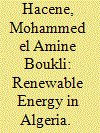

|
|
|
|
|
| Summary/Abstract |
Algeria, like other developing countries, has been committed to promoting the transition to renewable energy for several years. The national government established several laws and attractive subsidies that encouraged various socio-economic entities to use renewable energies and engage in more sustainable practices. Despite these efforts, industrial and private entities have not responded as hoped. To identify the factors that impede government efforts toward sustainable practices, this paper focuses on the two most energy-consuming sectors: building and transport. The analysis reveals that both financial and socio-cultural issues constitute the two main obstructive elements to energy transition in Algeria. This is the first study to be carried out in Algeria on technico-economic difficulties in the application of energy transition towards renewable sources.
|
|
|
|
|
|
|
|
|
|
|
|
|
|
|
|
| 8 |
ID:
175106


|
|
|
|
|
| Summary/Abstract |
The 1918–19 influenza epidemic arguably remains the worst natural disaster in the annals of colonial India. The scourge of the 1918–19 influenza in Punjab eclipsed the significant malaria epidemics of 1908 and the Bubonic plague catastrophe of the first decade of the 20th century. Over 800,000 people died from the outbreak between October and November 1918. This article examines the social and economic impacts of the 1918–19 influenza outbreak in Punjab. It argues that the scarcity of everyday food items as well as an escalation in the prices of staple foodstuffs were direct consequences of the epidemic. This study discovered that massive influenza mortalities triggered severe disruptions in the agricultural activities and public services in Punjab. Other studies had focused mainly on the spread and mortality of the epidemic in the public domains of colonial India. However, this study illuminates the socio-economic effects of an outbreak from a regional perspective. A focus on Punjab, the colonial capital of Northern India, affords us a rare privilege to gauge how epidemics influence the socio-economic spaces on a provincial basis.
|
|
|
|
|
|
|
|
|
|
|
|
|
|
|
|
| 9 |
ID:
175107
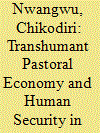

|
|
|
|
|
| Summary/Abstract |
The limited access to land in most African states has engendered a fierce competition, especially among various agricultural user groups. The two major groups of agricultural land users are transhumant pastoralists and sedentary peasant farmers. The internecine conflict between these agro-user groups has grave implications for human security in Nigeria and beyond. Explanation of the conflict has centred on climate change and environmental security, population growth and urbanisation, and insecurity. However, the transnational character of this conflict, often made possible by relevant regional protocols, has not received adequate scholarly attention. This paper argues that networking of regional bodies and other stakeholders is the panacea for tackling the tension-soaked relationship between these land users.
|
|
|
|
|
|
|
|
|
|
|
|
|
|
|
|
|
|
|
|
|